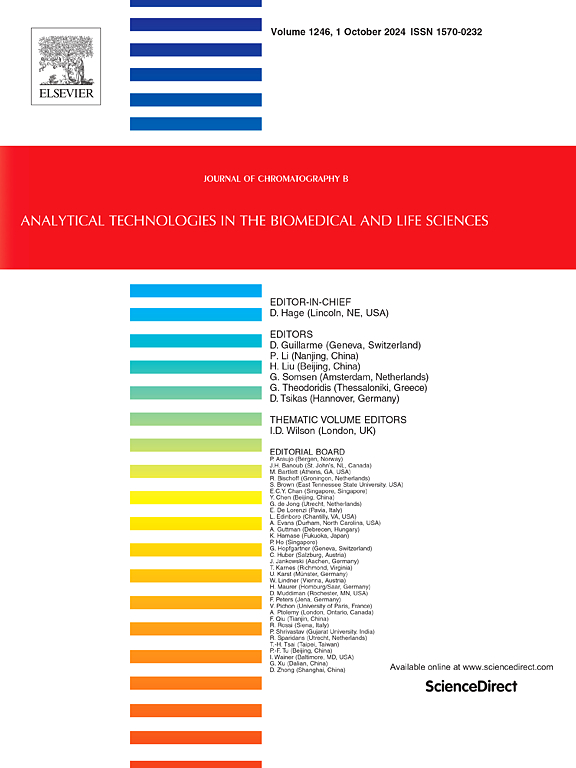全基因组关联分析确定了炎症机制介导脂质代谢对子宫内膜原位癌的影响
IF 2.8
3区 医学
Q2 BIOCHEMICAL RESEARCH METHODS
引用次数: 0
摘要
虽然脂质和炎症被认为是肿瘤进展的关键调节剂,但它们在子宫内膜原位癌(ECIS)(子宫内膜癌的前兆)中的因果相互作用机制仍未明确。尽管脂质代谢与癌症之间存在广泛的关联,但通过炎症介质驱动ECIS启动的具体途径尚不清楚。方法我们开创了一个综合孟德尔随机化(MR)框架,结合多变量MR、贝叶斯加权MR (BWMR)和敏感性分析来解决多效性问题。该方法系统地应用于179种脂质和91种炎症因子。方法的新颖性进一步包括中介分析,量化炎症因子在脂质- ecis通路中的作用。结果第一个证据揭示了磷脂酰胆碱(0:18:0_16:1)-TNFSF12-ECIS轴:TNFSF12介导4.894%的磷脂酰胆碱作用(OR: 2.925;贝塔:1.073;95% ci: 1.752-4.884;p = 4.032E-05),减弱了脂质与ecis的直接关联。这代表了炎症介导的脂质途径在ECIS发病机制中的首次证明。结论作为首个解码脂质- ecis因果关系的MR研究,我们建立了以下结论:整合贝叶斯核磁共振与癌症病因学研究中介分析的范式转换方法临床可操作的生物标志物(磷脂酰胆碱和TNFSF12)具有双重诊断和治疗靶向潜力。这些进展为通过脂质-炎症轴调节阻断ECIS进展提供了路线图。本文章由计算机程序翻译,如有差异,请以英文原文为准。
Genome-wide association analysis identified inflammatory mechanisms mediating the effects of lipid metabolism on endometrial carcinoma in situ
Background
While lipids and inflammation are recognized as key modulators of tumor progression, their causal interplay in endometrial carcinoma in situ (ECIS)—the precursor of endometrial cancer—remains mechanistically undefined. Despite broad associations between lipid metabolism and cancer, the specific pathways driving ECIS initiation through inflammatory mediators are unknown.
Method
We pioneer an integrative Mendelian randomization (MR) framework combining multivariable MR, Bayesian weighted MR (BWMR), and sensitivity analyses to address pleiotropy. This approach was systematically applied to 179 lipids and 91 inflammatory factors. Methodological novelty further includes mediation analysis quantifying inflammatory factors' role in lipid-ECIS pathways.
Results
First evidence reveals a phosphatidylcholine (O-18:0_16:1)-TNFSF12-ECIS axis: TNFSF12 mediates 4.894 % of phosphatidylcholine's effect (OR: 2.925; beta: 1.073; 95 % CI: 1.752–4.884; p = 4.032E-05), attenuating the direct lipid-ECIS association. This represents the inaugural demonstration of an inflammation-mediated lipid pathway in ECIS pathogenesis.
Conclusion
As the first MR study decoding lipid-ECIS causality, we establish the following:
- 1.A paradigm-shifting methodology integrating Bayesian MR with mediation analysis for cancer etiology research.
- 2.Clinically actionable biomarkers (phosphatidylcholine and TNFSF12) with dual diagnostic and therapeutic targeting potential.
- 3.These advances provide a roadmap for intercepting ECIS progression through lipid-inflammatory axis modulation.
求助全文
通过发布文献求助,成功后即可免费获取论文全文。
去求助
来源期刊

Journal of Chromatography B
医学-分析化学
CiteScore
5.60
自引率
3.30%
发文量
306
审稿时长
44 days
期刊介绍:
The Journal of Chromatography B publishes papers on developments in separation science relevant to biology and biomedical research including both fundamental advances and applications. Analytical techniques which may be considered include the various facets of chromatography, electrophoresis and related methods, affinity and immunoaffinity-based methodologies, hyphenated and other multi-dimensional techniques, and microanalytical approaches. The journal also considers articles reporting developments in sample preparation, detection techniques including mass spectrometry, and data handling and analysis.
Developments related to preparative separations for the isolation and purification of components of biological systems may be published, including chromatographic and electrophoretic methods, affinity separations, field flow fractionation and other preparative approaches.
Applications to the analysis of biological systems and samples will be considered when the analytical science contains a significant element of novelty, e.g. a new approach to the separation of a compound, novel combination of analytical techniques, or significantly improved analytical performance.
 求助内容:
求助内容: 应助结果提醒方式:
应助结果提醒方式:


